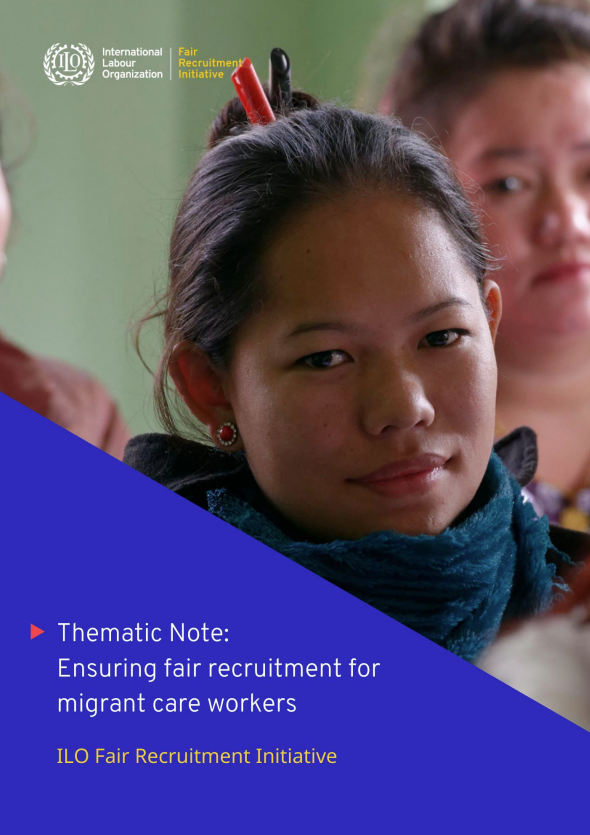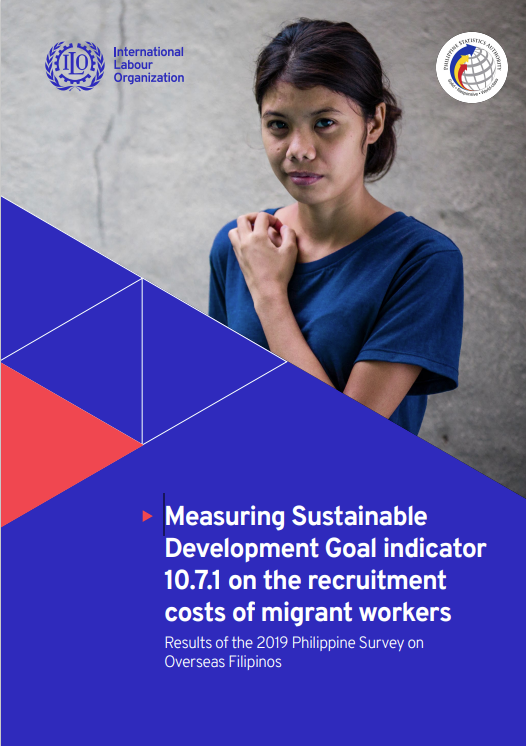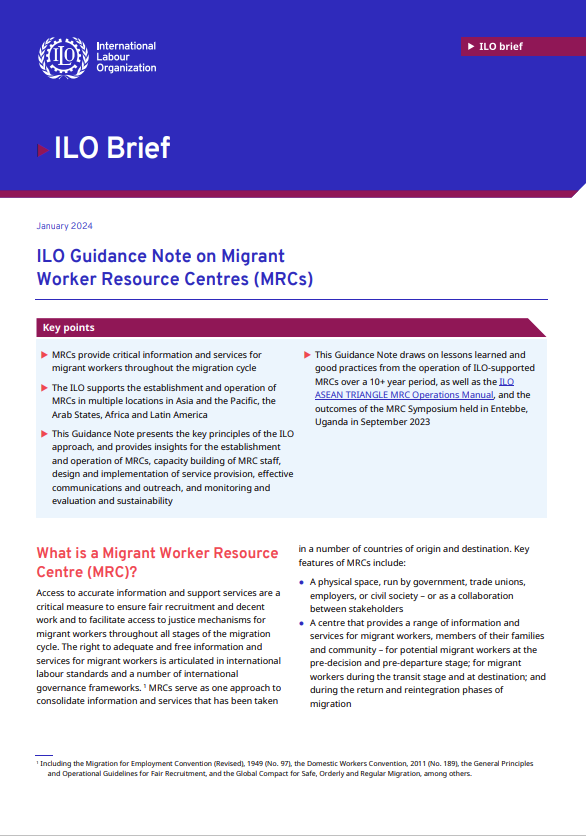Ghana Advances Fair Recruitment Agenda with the validation of two key reports
Posted at December 11th 2025 12:00 AM | Updated as of December 11th 2025 12:00 AM
Region/Country :
|Themes : , ,
Ghana: Country profile and national roadmap: Analysis of recruitment policy, processes and practices, an action plan for fair recruitment
This Recruitment Country Profile is a study on the legal and regulatory framework governing the recruitment and placement of migrant workers in Ghana that provides a comprehensive analysis of the existing national system, identifies gaps, and offers concrete recommendations to strengthen governance of recruitment based on workers’ rights.
Supported by the Integrated Programme on Fair Recruitment – Phase III (FAIR III), it represents an analytical and participatory effort to strengthen the governance of recruitment of migrant workers in Ghana. Grounded in the ILO’s General Principles and Operational Guidelines for Fair Recruitment and relevant international labour standards, it identifies key normative and institutional gaps in the current framework and proposes measures to align national legislation and policies with international standards. Through documentary analysis and tripartite stakeholder consultations, the study serves as a practical and strategic tool for guiding public policy, strengthening coordination among actors, and advancing fair recruitment.
The second part of the document is showcasing a National Roadmap to promote fair recruitment in Ghana, an effort to enhance labour migration governance and ensure the protection of migrant workers’ rights. Developed through a consultative process involving key stakeholders, the roadmap provides a strategic framework for fostering fair and transparent recruitment practices in Ghana.
It aims to align Ghana's national policies and practices with international labour standards and human rights relevant to fair recruitment, ensuring that migrant workers, whether in Ghana or abroad, are protected from exploitation, abuse, and discrimination and can enjoy decent and productive employment. In addition to more robust regulatory oversight, it supports the integration of fair business practices among employers, ensures a strong role for workers’ organizations, and engages media professionals to raise public awareness on labour migration and recruitment issues.
Type of document :
Country/Region :
Year of publication :
Theme : , ,
Awareness Workshops on Migrant Workers’ Rights Launched in Somalia
Posted at December 4th 2025 12:00 AM | Updated as of December 4th 2025 12:00 AM
Region/Country :
|Themes : , ,
Empowering Migrant Workers: Lessons Learned from ILO Migrant Worker Resource Centres in the ASEAN region
This publication draws on the experience of the International Labour Organisation’s support for Migrant Worker Resource Centres (MRCs) in the ASEAN region. It highlights how these centres improve access to information, legal aid, and social protection for migrant workers while promoting safe migration, decent work, and long-term sustainability through strong community partnerships and rights-based approaches.
MRCs offer a wide range of services, including counselling, psychosocial support, legal aid, information, outreach, pre-migration and post-return training, and targeted programmes for migrant women, people with disabilities, fishers, seafood processors and domestic workers. Their role in organizing migrant workers into networks and trade unions has helped build a collective voice and empower migrant workers.
The publication offers practical guidance to governments, trade unions and civil society organizations on improving delivery of information and services to support safe migration for decent work. It advocates for further investments in community-based support structures that prioritize the labour rights and empowerment of migrant workers. It was commissioned by the ILO's TRIANGLE in ASEAN, Safe and Fair/ PROTECT and Ship to Shore Rights programmes.
Type of document :
Country/Region :
Year of publication :
Theme :
Fair Recruitment Initiative Strategy 2026-2030: The way forward, from policy to practice
The Fair Recruitment Initiative (FRI) was launched by the ILO in 2014 to ensure fair recruitment of workers at the national and international level, bringing renewed visibility to this important issue. Over the years, the FRI has become a central pillar of the ILO’s Fair Migration Agenda and has strengthened collaboration among governments, employers, and workers to ensure transparent recruitment practices that protect workers' rights and uphold international labour standards through social dialogue and fair treatment.
The Fair Recruitment Initiative Strategy 2026–2030 sets a clear path forward: moving from principles and guidance to practical implementation and enforcement, to make fair recruitment a reality for all workers, across all sectors and countries, within and across borders. The new strategy was conceived as an inclusive process, reflecting evidence and data collected across countries, key migration corridors and high-risk sectors to ensure targeted interventions that tackle emerging challenges.
This work builds on a decade of experiences, achievements, and lessons learned. This new strategy has also benefited from the rich exchanges and inputs generated during the Global Conference “Fair Recruitment Initiative: The way forward, from policy to practice”, held in May. This conference, that brought together government officials, employers' and workers' representatives, recruitment agencies, international organizations, and researchers provided valuable guidance for moving from policy commitments to practical implementation. This tripartite high-level discussion served as a platform to review progress, explore practical solutions, and strengthen collaboration with stakeholders. The event marked the launch of this new strategy, reaffirming a common commitment to advancing fair recruitment through collective action.
Content available in English, español and français.
Type of document :
Country/Region :
Year of publication :
Theme : , ,
Policy brief: Fair recruitment of Lao migrant workers: A comparative review with international labour standards and guidelines
This policy brief offers a comparative analysis of the labour migration governance framework in relation to international standards and guidelines and provides recommendations to help ensure fair recruitment and decent work for Lao migrant workers.
The ILO Ship to Shore Rights South-East Asia programme has been working in close collaboration with the Ministry of Labour Social Welfare to strengthen policy and legislation related to the recruitment of Lao migrant workers since 2020. To support this effort, a comparative analysis of the labour migration governance framework was undertaken in relation to key international labour standards and guidelines, including the Private Employment Agencies Convention, 1997 (No. 181) and the ILO General Principles and Operational Guidelines for Fair Recruitment.
Although the Lao policy and legal framework was found to be in alignment with international labour standards and guidelines in many respects, the analysis identified significant legislative and implementation gaps. These include incomplete prohibitions on worker-paid recruitment fees and related costs, challenges in enforcing penalties and providing remedies for abuses, procedural and capacity challenges in dispute resolution, and lack of clarity and in the responsibilities of government agencies.
The policy brief recommends that the Lao Government consider ratifying the Private Employment Agencies Convention, 1997 (No. 181) to take the next steps forward in improving protection of the rights of Lao migrant workers during recruitment and placement. The ILO stands ready to provide any further technical support required by the Lao Government and social partners to facilitate the process of ratification for Convention No. 181 in the Lao People’s Democratic Republic.
Type of document :
Country/Region :
Year of publication :
Theme : , ,
Thematic Note: Ensuring fair recruitment for migrant care workers
This Note explores some of the key fair recruitment challenges for migrant care workers and outlines key policy priorities.
Type of document :
Country/Region :
Year of publication :
Theme : , , ,
Measuring Sustainable Development Goal indicator 10.7.1 on the recruitment costs of migrant workers: Results of the 2019 Philippine survey on overseas Filipinos
The report presents an assessment of the pilot process on measuring SDG indicator 10.7.1, undertaken by the Philippine Statistics Authority (PSA) in collaboration with the ILO.
The survey findings provide an indication on the burden of recruitment costs to overseas Filipino migrant workers. Results shed light on possible impacts of existing policies to protect Overseas Filipino Workrs (OFWs) as well as indicating future areas and target groups of policy focus when tackling issues related to high recruitment fees and related costs of Filipino migrant workers going to work abroad.
Type of document :
Country/Region :
Year of publication :
Theme : , , ,
ILO Brief: ILO Guidance Note on Migrant Worker Resource Centres (MRCs)
Migrant Worker Resource Centres (MRCs) provide critical information and services for migrant workers throughout the migration cycle. This Guidance Note presents the key principles of the ILO approach, and provides insights for the establishment and operation of MRCs, capacity building of MRC staff, design and implementation of service provision, effective communications and outreach, and monitoring and evaluation and sustainability.
Content available in english or español.
Type of document :
Country/Region :
Year of publication :
Theme :
Universities in East and Horn of Africa Unite to Launch Regional Labour Migration Knowledge Hub
Posted at September 24th 2025 12:00 AM | Updated as of September 24th 2025 12:00 AM
Region/Country :
|Themes : , ,
Subscribe to the Fair Recruitment Initiative Newsletter
Sign up to receive news delivered to your inbox.







